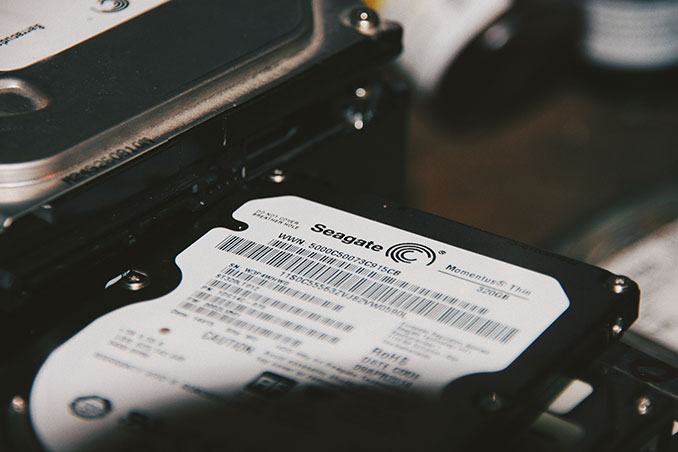Thursday, December 30, 2021 1:45 pm, Posted by Absolute Destruction

We spend our days in front of the computer dealing with businesses and transactions for some of us. We don't realize that nearly everything we do on our computers is stored in a storage device known as a hard disk drive.
The hard drive contains everything in your computer, including the operating system, software, image and data files, and documents. What most people don’t realize is that the hard disk drive will keep data in its memory even if you delete these files from your computer.
So what should you do if you want to wipe all memory from your computer completely? Data destruction is a simple yet crucial aspect of personal security and privacy. Learn more about hard drives and how to effectively destroy them in this post.
Hard Drive Explained
Hard disk drives (HDD), or simply hard drives, are a type of storage device typically used in computers or laptops. It serves as a digital data storage hardware that contains a PC's operating system, installed softwares, as well as your data files and documents.
Hard drives are either internal or external. Internal hard drives are installed on your computer's motherboard and act as your computer's primary storage device.
On the other hand, external hard drive units are independent devices. You can access them by connecting it via a USB cable to the computer. Ideally, external HDDs should be in a protective case to prevent damage.
The Need for Secure Hard Drive Destruction and Disposal
As mentioned earlier, hard disk drives serve as your computer's storage device. This means that everything you do and save on your computer is on the hard drive. So what happens if you want to get rid of every file, document, and data on your computer?
People often make the mistake of simply deleting the file or document on their computer. However, throwing files into the PC's recycle bin does not remove or destroy the said files.
Improper disposal of computers and hard drives pose a grave risk. Data from hard drives, even if deleted, can still be retrieved, albeit through a rather tedious process.
This means that if someone gets hold of the computer or hard drive you recklessly disposed of, they can retrieve possibly sensitive or personal information and use it against you. Fortunately, there are several ways to dispose of hard drives and ensure they are completely void of data.
Destroying and Disposing Your Hard Drive
Destroying and disposing of digital storage devices such as hard drives takes more than just wiping their contents. Before throwing an HDD away, you must ensure the data is no longer accessible. This is particularly important for people who store sensitive information such as contact details, bank information, financial records, or private photos and videos.
One way to ensure that your data is no longer recoverable is to destroy your hard drive completely. But, there are right and considerably wrong ways to do it.
The main goal of destroying your hard drive is to damage the internal platters that store the data and memory.
One way to ruin your hard drive is to disassemble it from its case, open it up, and destroy the platters only. You can use magnets to fry the data from the device or sand the platter's surface to remove its magnetic coat.
Rougher methods of destroying your HDD include spiking the platters with a nail, hammering it repeatedly until parts disintegrate, or shredding it.
On the other hand, there are also ways to destroy a hard drive that is neither safe nor smart. One example is dunking the device underwater. Although dunking an electronic device underwater will destroy parts of it, the platter will still be intact and thus recoverable.
Other options you would want to avoid include setting the HDD on fire, microwaving it, dropping it from a high place, or melting it with acid. You can be methodical about it or go completely nuts.
Things to Keep in Mind When Destroying Hard Drives
About Do It Yourself Methods
DIY data destruction methods can be unsafe as well as inefficient. Since you probably have little to no knowledge about data destruction, you can easily make a mistake and fail to destroy your hard drive effectively.
About Government and Data Security
Cybercrime is a serious offence. An NSA mandate requires that all data from computers be cleared before disposal to avoid data and information leaks from digital devices.
About Data Deletion
Technological advancements benefit hackers as they provide more opportunities to victimize unsuspecting individuals. It is important to remember that simply deleting sensitive files, documents, and information from your computer is not enough to keep hackers from accessing it.
Don't rely on do-it-yourself methods when you destroy and dispose of your hard drives. Schedule an appointment with Absolute Destruction and let them deal with it.
Pro Tip:
“Don't compromise your hard drive destruction by employing multiple methods in the process.”
Dedicated and Reliable Hard Drive Destruction and Disposal Service
It is important to wipe all data on your hard drive before throwing it away. If you simply dump your hard drive or laptop in the trash, private, confidential, or sensitive information in the device that you wouldn't want other people to see may still be accessible.
Hard drive destruction is vital in keeping your information safe from malicious attacks and threats. Have professionals deal with destroying your digital storage device, so there is no risk or liability. Contact Absolute Destruction for data destruction, commercial shredding, and specialty destruction services in Southwestern Ontario.
What is Hard Drive Destruction & Why Do You Need it FAQs
Does removing a hard drive remove all data?
The hard drive contains all your device's data and operating system. Removing it from your laptop means that the device will not boot properly. The data will still be safely stored in the hard drive as long as there is no damage done to the device during the whole process.
Does scratching a hard drive make it unreadable?
Scratches on the hard drive platter can cause device readability issues. However, it is also important to note that data stored in a scratched hard drive may still be recoverable.
What happens to the data after we remove it from the hard disk?
When stored data is deleted from a hard drive, the bytes that form that content are removed. The space is marked as available or free so that it could be overwritten by new content. The data itself is still in the hard drive and can still be retrieved.

